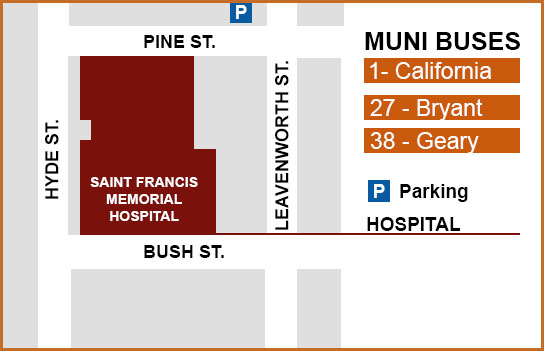Saint Francis Memorial Hospital’s Lymphedema Services
Lymphedema
Lymphedema is abnormal swelling in the body caused by a damaged or blocked lymphatic system, which prevents the proper circulation of lymph fluid within the affected area.
Lymph is the general fluid that makes up the human body and is similar to blood plasma, but plays a critical role transporting proteins, fats, and even bacteria, throughout the body. Lymph is carried in specialized dedicated lymphatic channels, similar in concept to the body’s system of arteries and veins. A blockage in the lymphatic system, regardless of the cause, creates a backup of lymph fluid within a certain area of the body, referred to as lymphedema.
If left untreated, lymphedema causes unsightly swelling, pain, loss of motion, and disability. Recurrent skin and soft tissue infections can develop, sometimes requiring inpatient hospitalization and intravenous antibiotics. In certain instances, this can even become life-threatening.
Causes of Lymphedema
Impaired lymphatic drainage most often results from injured or removed lymph nodes, as is commonly seen in patients with cancer or cancer-related surgeries. The lymph channels that drain into the affected lymph nodes become blocked, akin to shutting down a toll-booth plaza for a highway. Traumatic injuries may also damage lymphatic channels in the arms or legs, which prevents fluid from draining properly, equivalent to shutting down a highway due to an accident. Whether the lymph node or the lymphatic channel is damaged, the end result is the same – a “traffic jam” due to poor drainage of lymph fluid, causing buildup of fluid, swelling, inflammation, and lymphedema.
This process develops wherever lymph vessels are missing or impaired and cannot adequately drain lymph fluid. Although this most commonly occurs in the arms or legs, it may also occur in other parts of the body, including the breast, trunk, head and neck, or genitals.
Our Treatment for Lymphedema
Complete treatment of lymphedema requires an experienced, specialized team composed of certified Lymphedema Therapists as well as Plastic Surgeons subspecialized in Microvascular Surgery. Saint Francis Memorial Hospital offers nonsurgical and surgical management to not only prevent progression and worsening disease, but also potentially restore lymphatic function and improve quality of life.
Each patient is unique. Our specialized team will evaluate your symptoms and create a customized treatment plan to achieve symptom management with the goal of long-term improvement.
First-line therapy consists of conservative (non-invasive) treatment with our lymphedema therapists, who are experienced in performing Complete Decongestive Therapy (CDT), the current international standard and therapy choice for the treatment of this condition. CDT is endorsed by the American Cancer Society and the National Cancer Institute.
CDT is a noninvasive, safe, and reliable treatment regimen proven to have long-term effectiveness in facilitating drainage and circulation, aiming to reduce the debilitating symptoms that result from a damaged lymphatic system.
CDT may include some or all of the following therapeutic techniques:
- Manual Lymph Drainage
- Graduated Compression Wrapping
- Therapeutic Decongestive Exercises
- Skin Care
- Patient Education
Manual Lymph Drainage (ML)D is an important component of CDT. It is a gentle manual treatment to activate the lymphatic and interstitial fluid circulation. This helps remove metabolic wastes, alleviate pain, and calm the nervous system. MLD can be used to help accelerate healing from injuries, surgical trauma, chronic conditions, and edema.
Second-line therapy consists of specialized surgical treatment if symptoms fail to improve or worsen. The current cutting-edge surgical treatments include lymphovenous anastomoses (LVA) and vascularized lymph node transfer (VLNT).
In lymphovenous anastomosis surgery, a subspecialty-trained microsurgeon will work under a surgical microscope to divert any remaining working lymph channels into nearby veins, restoring drainage of lymph fluid past the blockage. This utilizes several 2-3cm incisions in the affected area, and the wound size and depth are similar in nature to having a cyst excised or scar revised. This typically requires anesthesia but is an outpatient procedure.
A vascularized lymph node transfer is a larger surgery that moves functional lymph nodes to the affected area. VLNT is essentially a transplant surgery -- but the donated “organ” is healthy lymph node tissue, and the donor is oneself. Surgery requires inpatient hospitalization for several days to monitor the health of the lymph node transplant. To prevent lymphedema in the donor area, we use reverse lymphatic mapping to identify critical lymph nodes that must not be harvested. The transplanted lymph nodes then resume function in the affected area and work to divert lymph fluid into the bloodstream as well.
Third-line therapy is considered in advanced stage lymphedema where LVA and VLNT are not possible or would not be helpful. In this stage of disease, the swelling and inflammation in the affected area causes irreversible firmness and scarring. Here, treatment is aimed at reducing the debilitating excess bulk to improve limb mobility, hygiene, and prevent skin infection; but this does not treat the underlying cause of lymphedema. Surgery is performed using either aggressive liposuction, or direct excision of tissue.
Referring to our Team
Patient Referrals
Patients are required to have a current prescription for CDT from their physician. The referring physician will be responsible for overseeing the patient’s care and treatments recommended by the physical and occupational therapist. Physicians are regularly updated on the patient’s progress.
Referral forms may be obtained by request by calling the therapy center main line at (415) 353-6275.
With help from Saint Francis Memorial Hospital’s trained lymphedema therapists, lymphedema can be managed. Therapy reduces swelling, prevents skin infections, and improves function and quality of life.
Lymphedema Services Location / Parking

Directions
The Lymphedema Therapy clinic is located on the first floor of St. Francis Memorial Hospital at 900 Hyde St. in San Francisco. After checking in at the security desk, proceed past the elevators and continue toward the far left side of the building. Follow the signs for “Outpatient Therapy / Physical Therapy.”
Saint Francis Memorial Hospital
Outpatient Therapy Services Department
Lymphedema Services
900 Hyde Street, 1st floor
San Francisco, CA 94109
(415) 353-6275

